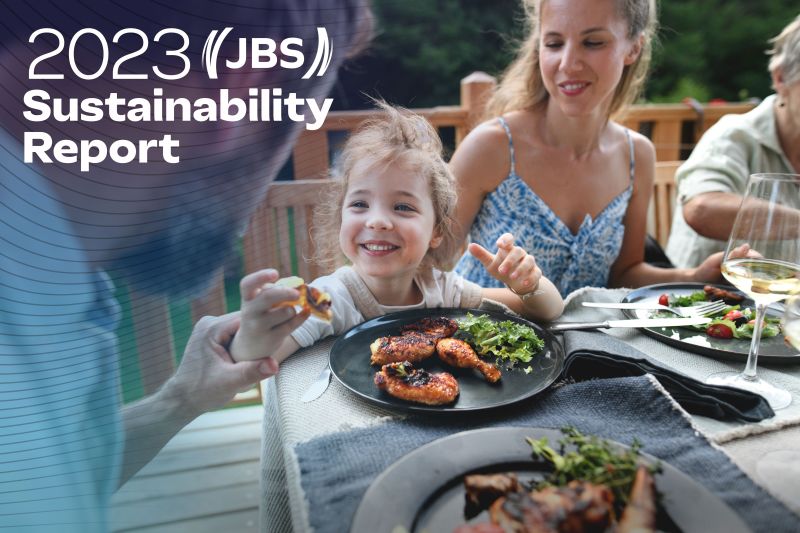JBS Releases 2023 Sustainability Report

JBS’ recently launched 2023 Sustainability Report outlines the company’s sustainability approach and initiatives, strategies in action across the value chain, and progress toward our global goals.
“As a food company with operations in 20 countries, we are part of a resilient global food system tasked with increasing food production to feed a growing global population,” said Gilberto Tomazoni, JBS Global Chief Executive Officer. “Sitting in a pivotal position in the food value chain – upstream from rural producers, grain originators, and input suppliers, and downstream from distributors, retailers, restaurants, and consumers, JBS can help influence and drive change across a complex supply chain.”
JBS has a number of key sustainability strategies across the company’s operations in Australia, Brazil, Canada, Europe, Mexico, New Zealand, the United Kingdom and the United States. They include assisting farmers with stewarding natural resources and enhancing productivity; sourcing responsibly-produced agricultural commodities; producing sustainable food; strengthening food systems and communities; and operating responsibly.
“As we tackle the many sustainability topics that need our attention, taking a systems approach is key,” said Jason Weller, JBS Chief Sustainability Officer. “This encourages and allows for innovation, collaboration, prioritization, and investment – all of which are essential to making meaningful progress.”
Here are a few highlights from this year’s report.
- The company has invested more than $150 million across hundreds of projects in facilities to reduce Scope 1 and 2 greenhouse gas emissions, resulting in a 17 percent decrease in intensity since 2019.
- More than $5 million in partnership projects have been approved to further the company’s Scope 3 greenhouse gas emissions reduction strategy throughout the value chain.
- In Brazil, JBS has driven groundbreaking initiatives to enhance transparency and traceability in the livestock supply chain, such as the Transparent Livestock Farming Platform.
- In the U.K., investments have been made in climate-smart facility upgrades and an off-grid poultry farm of the future.
- In the U.S. and Australia, the company has established multiple methane-to-renewable-energy conversion initiatives.
“There is much more work to do, and at JBS, we will keep doing our part,” Tomazoni said. “We seek to make food affordable to everyone around the world, with excellence.”
JBS is striving to set the food industry standard for profitable and sustainable food production for a growing planet. This means improving the sustainable performance and resiliency of not only the company’s own operations but also contributing to the enhanced sustainability of the greater food production system as a whole.
“Our belief at JBS is that no one company or organization can address the issues we face alone,” Weller said. “As such, we look to partner with stakeholders throughout the value chain to more effectively address this critical work. We invest time, expertise, and resources into creating a better future and a more resilient food system in key areas such as economic viability, environmental quality, global food security, affordable food choices, and improved quality of life for people doing the work.”
To learn more, the comprehensive report can be viewed here.
